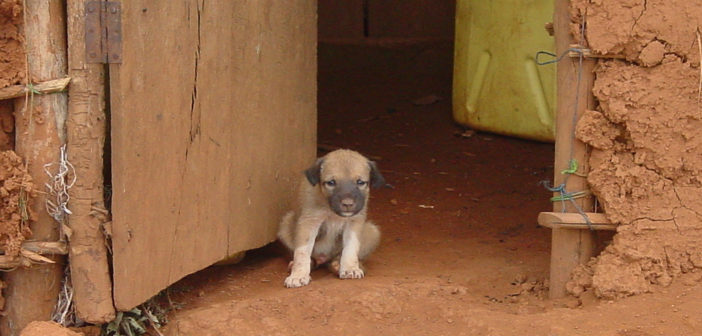Canine rabies is endemic in most African countries and the risk of human rabies is estimated by the World Health Organization (WHO) to be high in Cameroon. In a bid to control the disease, many approaches have been attempted. Of these, wide-scale vaccination of dogs has proven the most effective. In fact, only regular vaccinations of dogs protect people and animals against life-threatening rabies infections in the long term. By creating a healthier dog population, we lay the groundwork for impressive future results in terms of combating rabies.
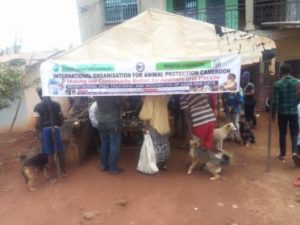 From November 1st to 3rd, OIPA (International Organization for Animal Protection) Cameroon volunteers implemented a rabies and distemper vaccine program in Makon, Cameroon, an area where the population is still unaware of the vital importance of vaccinations for dogs against rabies and distemper. The campaign, carried out under the title “Making Our Community Better for Animals and People,” aimed at educating the community, especially dog owners, on animal care and protection. AKI (Animal-Kind International) provided financial resources to conduct this mass vaccination project.
From November 1st to 3rd, OIPA (International Organization for Animal Protection) Cameroon volunteers implemented a rabies and distemper vaccine program in Makon, Cameroon, an area where the population is still unaware of the vital importance of vaccinations for dogs against rabies and distemper. The campaign, carried out under the title “Making Our Community Better for Animals and People,” aimed at educating the community, especially dog owners, on animal care and protection. AKI (Animal-Kind International) provided financial resources to conduct this mass vaccination project.
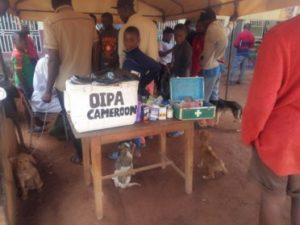 Given the wide-ranging advertisements about the project, many anxious pet owners crowded the OIPA office, even before November 1st, with their pets to be treated. Both stray and owned dogs in this community are living without basic medical care. They suffer from fleas, ticks, worms, mange and are susceptible to fatal diseases such as rabies, parvo and distemper.
Given the wide-ranging advertisements about the project, many anxious pet owners crowded the OIPA office, even before November 1st, with their pets to be treated. Both stray and owned dogs in this community are living without basic medical care. They suffer from fleas, ticks, worms, mange and are susceptible to fatal diseases such as rabies, parvo and distemper.
On day one, the project started with a community awareness campaign aimed at improving public health and safety by reducing the incidence of rabies and dog bites and raising empathy and kindness towards street dogs. The community is largely uneducated about animal health and behavior, and most are too fearful of getting rabies to even approach free roaming dogs or treat them with kindness. OIPA volunteers met with the village councils, schools, community and religious groups and disseminated educational materials to better inform the population on the importance of this campaign.
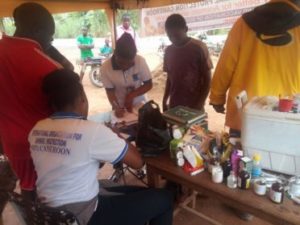 On day two, sensitization continued as OIPA volunteers conducted a door-to-door campaign to further explain to people in the community about the treatment and vaccination program, its importance to animals and how it will benefit not just the animals but also pets owners and the whole community. Animal owners’ response has been overwhelming. Many of them thanked the team for finding time to educate them and promised to improve the condition of their animals.
On day two, sensitization continued as OIPA volunteers conducted a door-to-door campaign to further explain to people in the community about the treatment and vaccination program, its importance to animals and how it will benefit not just the animals but also pets owners and the whole community. Animal owners’ response has been overwhelming. Many of them thanked the team for finding time to educate them and promised to improve the condition of their animals.
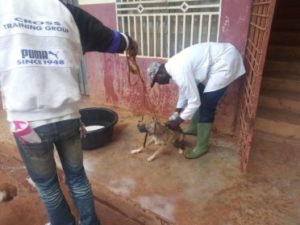 Besides the community sensitization campaign, another vital component of the project was the vaccination of both owned and stray dogs. On day three, a vaccination team was stationed and ready to vaccinate cats and dogs. The day started early in the morning with a massive and amazing turn out. It was at that moment OIPA volunteers realized the power of education and how human ignorance has led to suffering for many dogs in rural communities. The team registered every dog upon arrival for follow-up care and collected basic information. They further interviewed owners on the health conditions, feeding habits and general welfare of their pets.
Besides the community sensitization campaign, another vital component of the project was the vaccination of both owned and stray dogs. On day three, a vaccination team was stationed and ready to vaccinate cats and dogs. The day started early in the morning with a massive and amazing turn out. It was at that moment OIPA volunteers realized the power of education and how human ignorance has led to suffering for many dogs in rural communities. The team registered every dog upon arrival for follow-up care and collected basic information. They further interviewed owners on the health conditions, feeding habits and general welfare of their pets.
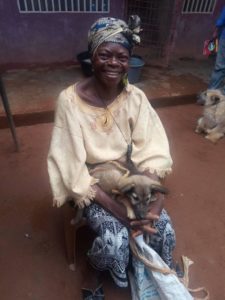 Dogs were dipped in sterilized water to wash off ectoparasites. It was observed that most pets suffered from bacterial infections, worm infestations, lack of appetite, ectoparasites and anemia. Nearly all the dogs had fleas and ticks and many had worms and other illnesses. The washing was then followed by intramuscular administration of antibiotics and deworming for both cats and dogs, and animals with wounds were treated.
Dogs were dipped in sterilized water to wash off ectoparasites. It was observed that most pets suffered from bacterial infections, worm infestations, lack of appetite, ectoparasites and anemia. Nearly all the dogs had fleas and ticks and many had worms and other illnesses. The washing was then followed by intramuscular administration of antibiotics and deworming for both cats and dogs, and animals with wounds were treated.
As the day proceeded, more pet owners approached the treatment point with their pets, and applauded the initiative to free our communities from common canine and feline diseases. Finally, at 4:30 p.m., the treatment came to an end. The OIPA team has done something very good for this community and potentially saved the lives of people, children and dogs from a terrible disease. Many thanks to Animal Kind International for funding this project.
Featured image: A stray puppy in Uganda. Image credit Laura, CC BY-SA 3.0. All other images in this story credit to OIPA Cameroon.

